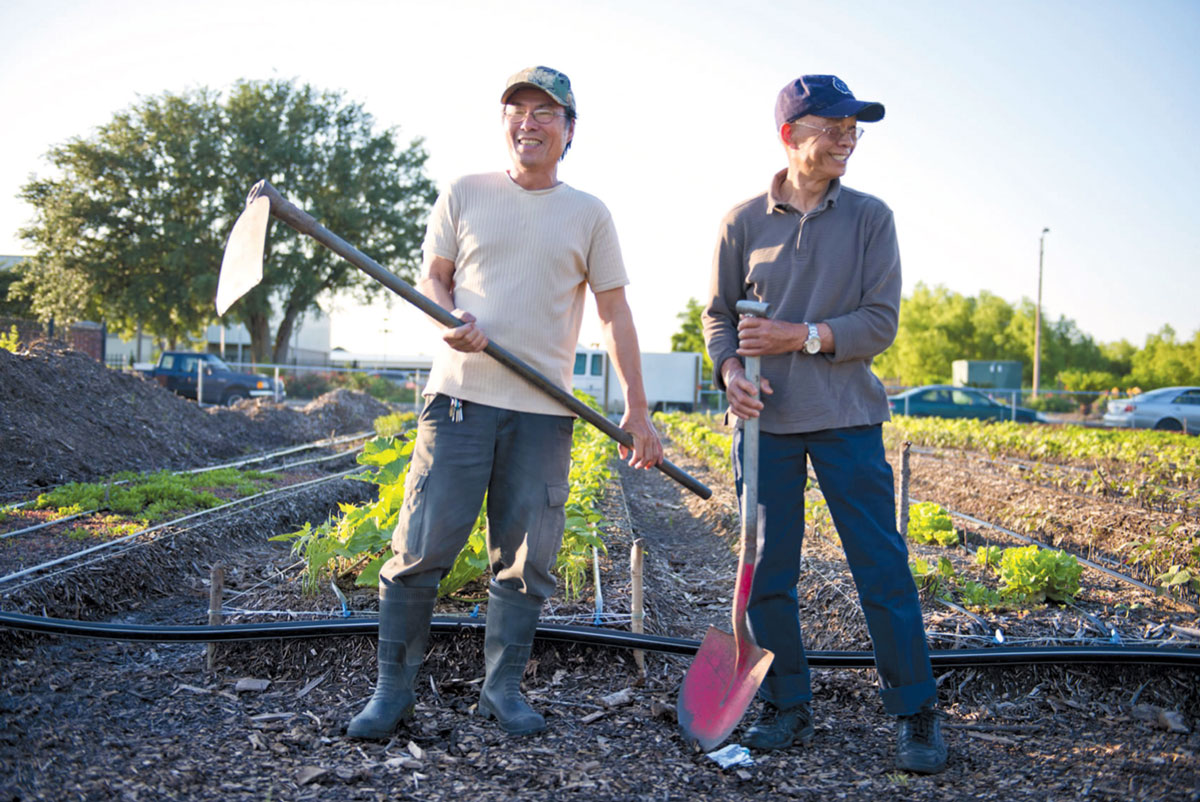VEGGI Farmers Cooperative: Cultures, Cuisines Meld in Community Co-op Garden
Once littered with patches of broken concrete, weeds, and standing water, a lot in residential New Orleans East is now providing food, jobs, and a source of pride for its residents.
Located across the street from the Mary Queen of Vietnam Church, Village de l’Est Green Growers Initiative, or VEGGI Farmers Cooperative, started shortly after the BP oil spill as a way to meet the needs of the immediate community.
Dependent upon the seafood industry, many workers were uncertain when the jobs would come back. Instead of waiting for the fish to bite again, 12 growers and program developers elected through a community forum decided to utilize their background in sustainable agriculture to form the co-op and provide a steady harvest of herbs, vegetables, and even tofu to restaurants, grocers, and community members.
Now, eager people fill the waitlist, hoping to become involved with the project. Twenty percent of the members’ gross revenue gets reinvested into the nonprofit, with members deciding how the money will be spent, so there are many considerations in mind when a new member is accepted into the group. Candidates must go through an interview process, disclosing their income status and their reasons for joining the co-op before they get voted in.
“Every additional member you add is another person that has a say into how that money is spent. It’s really important that everyone is very comfortable with each other,” explains Project Manager Daniel Nguyen.
Given urban farming’s recent popularity, Nguyen is quick to point out that it is far from easy. “When we were first starting the farm, there was no time for a personal life. Being a farmer is not that glorious. It’s so romanticized nowadays, but it is super hard work. You just can’t take a vacation—who’s going to take care of your crops?”
Still, the payoff has been worth it, impacting the community with jobs and incomes that in some cases have surpassed what growers earned before the oil spill.
“One of our growers was an oyster shucker, and at one point we were able to 100% supplement her pre–BP oil spill income and have continued to exceed that, which really shows the economic impact of what we’re doing.” All of the growers live with in a two-mile radius of the farm.
Nguyen has noticed a shift in product demand since VEGGI first started. “We couldn’t even get in the door with Vietnamese produce. That’s why we shifted so heavily to more identifiable things like basil, lettuce mixes, mustard greens, collard greens, and mirlitons, for example; but gradually people started to ask ‘Hey, do y’all grow Vietnamese things? I’d like to try them.’”
In a way, VEGGI is acting as an ambassador for Vietnamese ingredients that chefs might have otherwise dismissed. Vietnamese Thai roselle blossoms graced the fish special at Martinique Bistro last spring and lemon balm, usually reserved for spring rolls, is turned into cocktail syrup at Maurepas.
The cultural exchange is twofold: Nguyen has taken growers to restaurants that VEGGI sells to in order to expose them to mainstream metropolitan culinary trends.
“A lot of our growers are older Vietnamese folks, and their perception is they can’t believe that Americans would be into eating Vietnamese food. To them it’s like peasant food. We’ve taken them out to some restaurants, to show them ‘This is what they’re doing with your herbs.’ It’s not just food but it’s also cocktails.”
Nguyen points out that “we’re not fully Vietnamese, since we grow a lot of American vegetables that a lot of Vietnamese people wouldn’t usually eat, but we’re not straight up fully American either, so it’s been a pretty cool cultural in-between.”
The farm is also expanding its summer internship program, tailoring a curriculum around individual student needs, showing them how their school work is applicable to farming.
“Kids say ‘Why do we have to learn about physics?’ but there’s actually a lot of physics that goes into farming. For example, one of them wanted to get into civil engineering as a college student, so we developed a physics, chemistry, and biology curriculum and he was able to simulate his own aquaponics system. And one girl just got into nursing school, so she helped us develop a public health curriculum around healthy eating. One was into media and communications, so she helped us do brand development. We really try to hone in on their interests and make an impact, or at least give them some skills they can walk away with.”




